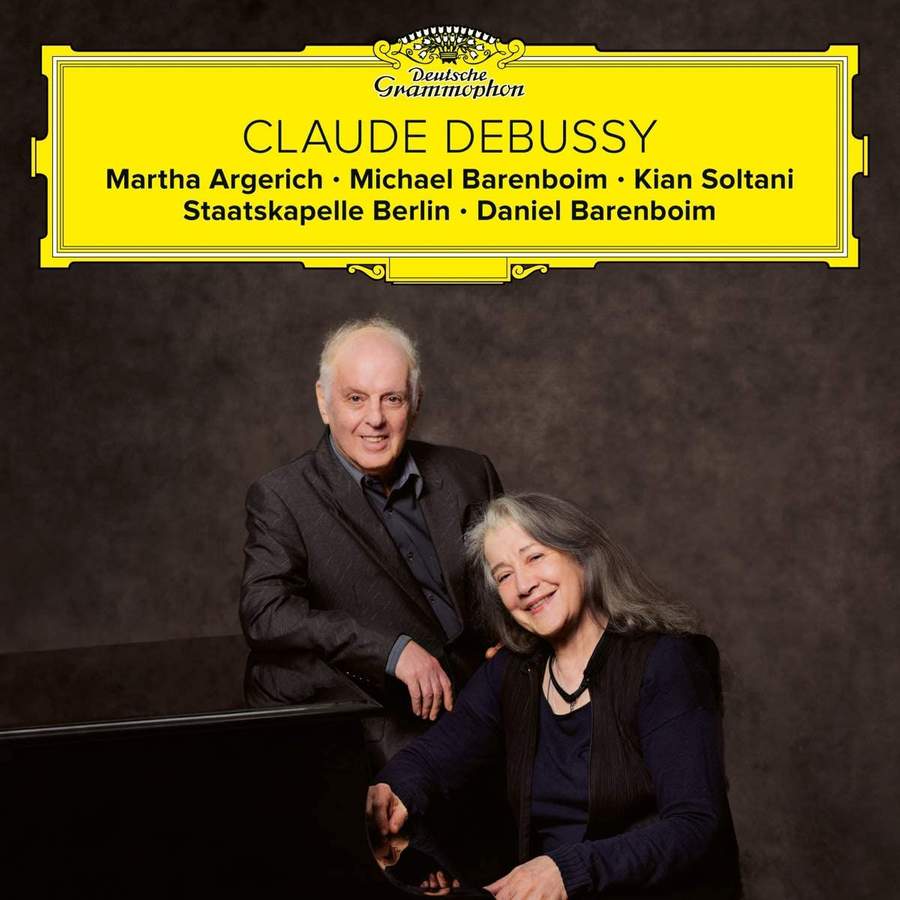DEBUSSY Fantasie. La Mer (Martha Argerich)
View record and artist detailsRecord and Artist Details
Composer or Director: Kian Soltani
Genre:
Orchestral
Label: Deutsche Grammophon
Magazine Review Date: 07/2021
Media Format: CD or Download
Media Runtime: 72
Mastering:
DDD
Catalogue Number: 483 7537

Tracks:
| Composition | Artist Credit |
|---|---|
| Fantaisie |
Claude Debussy, Composer
Berlin Staatskapelle Daniel Barenboim, Conductor Martha Argerich, Piano |
| Sonata for Violin and Piano |
Claude Debussy, Composer
Daniel Barenboim, Piano Michael Barenboim, Violin |
| Sonata for Cello and Piano |
Claude Debussy, Composer
Daniel Barenboim, Piano Kian Soltani, Composer |
| (La) Mer |
Claude Debussy, Composer
Berlin Staatskapelle Daniel Barenboim, Conductor |
Author: Harriet Smith
Martha Argerich was clearly on fiery form when she was captured live in May 2018 in Debussy’s early Fantaisie, a work new to her discography. I was excited at the prospect of this as it seems a work utterly suited to her febrile virtuosity and there’s a freshness to her playing that utterly belies her years, while her sense of shading and dynamic is a constant delight, to which Barenboim responds by coaxing wonderfully sinuous lines from the Staatskapelle Berlin, from the entwining oboe and cor anglais near the opening onwards. He also reminds us how much this sound world has come from that of Wagner. The slow movement is suitably rapt, with Argerich bending even the simplest-looking lines in her uniquely personal way. In the finale I’ve long had a soft spot for Kocsis and Fischer, who are truly daredevil in their speed, while the Award-winning Bavouzet and Tortelier are superbly idiomatic; this new recording offers a steadier ride but Argerich injects it with so much impetuosity that it never sounds studied, and the closing moments are suitably upbeat and vibrantly coloured.
That, unfortunately, is the last we hear of Argerich. Much as I admire Barenboim for his ability to assimilate repertoire with which we don’t necessarily associate him – and Debussy’s chamber music is one such example – the downside can be a lack of idiomatic detail. In the first movement of the Violin Sonata with his son Michael, for instance, the skittish passage linking to the Appassionato (track 4, from 0'43") comes across with a greater sense of playfulness in the hands of Renaud Capuçon and Bertrand Chamayou, and there is in general a lack of sensuousness in Debussy’s more languorous moments. In the Intermède, meanwhile, Michael Barenboim is inclined to treat the violin recitative as a virtuoso exercise, compared to which Capuçon brings more fantasy. The finale does at least go with a will, but in places it lacks subtlety (such as the piano’s ominous-sounding motif from 0'45", which is much more blatant in Barenboim’s hands than in Chamayou’s), while the piece is cut off almost too abruptly here, whereas in the Capuçon recording the final chord is placed just so.
The Cello Sonata throws up similar reservations, despite the calibre of Kian Soltani – sample the au mouvement in the first movement (from 1'22"), which is less magically voiced than in Edgar Moreau’s reading with Chamayou, while the shading into darker territories moments later is arguably too muddy. You get the sense that Soltani is alive to the radicalism of the second movement’s textures, with its extraordinary pizzicato cello-writing, but Barenboim is simply too heavy in his handling of the piano part. The finale is unduly slow, too, with the pianist sounding ill at ease.
Back to Barenboim the conductor and we should be in safer waters. He previously recorded La mer with the Orchestre de Paris back in 1978, 40 years before this live one with the Staatskapelle Berlin. And although there are unquestionably things to admire in the orchestral playing per se, with particularly characterful winds and brass, the problem is that I found myself admiring this detail and that, rather than experiencing the drama of each seascape as an entity. The second-movement ‘Jeux de vagues’ had a responsiveness in his earlier account but here feels too drawn out. And the tread of the third movement has little of the sense of inexorable power that you find in Haitink, Boulez or Roth and his period-instrument Les Siècles. That said, this album is still worth hearing for Argerich.
Discover the world's largest classical music catalogue with Presto Music.

Gramophone Digital Club
- Digital Edition
- Digital Archive
- Reviews Database
- Full website access
From £8.75 / month
Subscribe
Gramophone Full Club
- Print Edition
- Digital Edition
- Digital Archive
- Reviews Database
- Full website access
From £11.00 / month
Subscribe
If you are a library, university or other organisation that would be interested in an institutional subscription to Gramophone please click here for further information.




